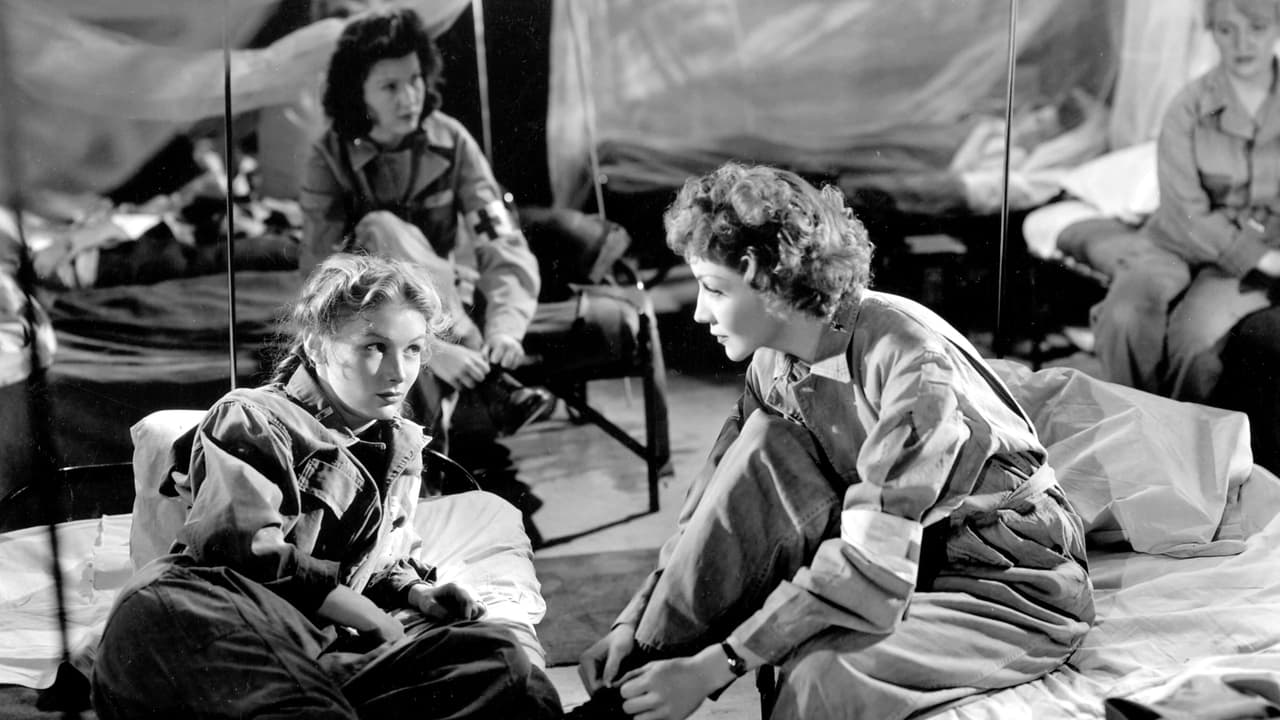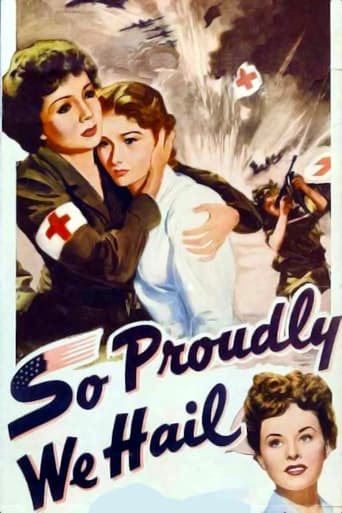

During WWII, Hollywood made a bazillion war films. Almost all of them were clearly propaganda pieces--lacking realism and intended only to bolster the war effort. Allied soldiers were, generally, supermen and the enemy were subhuman monsters. The films were effective but don't age well. However, a few war films from the era managed to be very effective yet realistic--sticking to the facts but doing such a thoroughly good job that they are timeless. Two of the best of this era have to do with the same events--the loss of the Philippines to the Japanese. One, "In Harm's Way", is told from the viewpoint of two Patrol Boat captains and this film, "So Proudly We Hail!" concerns an ensemble cast of nurses stuck on Bataan during the final weeks of this battle. Both are about equally good--and both are true classics.The film begins with a small group of nurses en route from the Philippines. They've been evacuated and are heading to safety. However, several of them are clearly damaged--in particular the one played by Claudette Colbert. The story then flashes back to the beginning of the story--and you learn about all the nurses but particularly how Colbert got to this state. Among the cast are Colbert, Paulette Goddard and Veronica Lake. And, among the guys they fall for during the war are George Reeves (TV's Superman) and Sonny Tufts.What I really liked about the film is that although the characters are fictional, the action is very real. The war isn't sensationalized or sugar-coated--it's bloody, brutal and unrelenting. And, unlike most war films of the day, it doesn't assume the audience is stupid and realizes it can paint a realistic portrait and still contribute to the war effort. The usual jingoism is absent--just a lot of good folks giving their lives in the line of duty. As a result, the film is often heartbreaking and is bound to make an emotional connection with the viewer. Paramount should be appreciated for a great script, exceptional acting and wonderful sets and special effects, as it looks like you'd think the Philippines SHOULD look. One of the best war pictures of the era--and one worth seeing.By the way, Colbert's next film, "Since You Went Away" was also one of the greatest films of the era to deal with the war. It tells an amazingly touching story of a mother and her two daughters as they cope with the absence of loved ones. It's also a tearjerker and well worth seeing.
... View MoreDirector Mark Sandrich and Screenwriter Allan Scott have interviewed eight U.S. Army nurses surviving the perils of World War II during its devastating raids on Pearl Harbor, in Hawaii, and Bataan and Corregidor, in the Philippines.Paramount Pictures produces this resulting dynamic anti-war film, "So Proudly We Hail!" (1943), complete with many barbarian attacks on innocent lives and a great amount of bloodshed under treacherous conditions.Its leading ladies and several well-known supporting actresses portray U.S. Army Lieutenants, serving as nurses to care for wounded Service personnel and civilians during the war-torn Pacific Campaign. This stars Claudette Colbert as Janet "Davy" Davidson, Paulette Goddard as Joan O'Doul, Veronica Lake as Olivia D'Arcy, Mary Treen as Sadie Schwartz, Ann Doran as Betty Peterson, Barbara Britton as Rosemary Larson, and Mary Servoss as Captain "Ma" McGregor, with Yvonne De Carlo in an uncredited roll.George Reeves as Lieutenant John Summers plays opposite Miss Colbert as her romantic leading man, with Sonny Tufts as Kansas to interact with Miss Goddard, with Walter Abel as Chaplain and James Bell as Colonel White.The story is told primarily in flashback sequence, with narration by Paulette or Mary to introduce its scenes, after eight Army nurses arrive in Brisbane, Queensland, Australia, in order to explain the one among their group not responding to human contact.It all begins on the evening of the group's deployment from San Diego, California, early in December of 1941, and their nearing their proposed station in Hawaii, but they must change their course to head toward the Philippines, in the aftermath of tragedy.Along the route, shipmates witness the bombing of a different ship, and survivors are rafted onto board their vessel, one of their new passengers an Army nurse, Lieutenant Olivia D'Arcy, who has been stationed at Pearl Harbor during the invasion.Olivia, however, does not wish to participate in the shipboard merriment of the Christmas Eve gathering, at which the perennially flirtatious Joan wears her black lace negligee as an evening gown, to boost community morale, while the altruistic Janet attempts to reach an understanding with her distant new nurse.From here, most of the on-land action transpires in Bataan and Corregidor, employing very graphic scenes of the results of enemy aerial bombings and gunfire.Veronica Lake forsakes her Peekaboo hair style to sport the School-Marm look characteristic of this era because Defense Plant employees emulating her famous cascading coiffure have unfortunately been finding their hair to catch into machinery gears.All-in-all this makes for a very downbeat but heavily worthwhile film, containing nice touches of pleasantries along the way, all worth revisiting over the years, but upon this most recent viewing, the electricity went out throughout the community (during a bombing scene in the film) after a vehicle struck a utility poll down the road, thus magnifying the poignant effects of this film amid the atmosphere of actual sirens in the backdrop of the outdoor and indoor darkness.
... View MoreNot a single nurse in 1942-1945 who served in the Philippines died during the Japanese invasion or later in Japanese prison camps.In contrast, the death rate among males in both situations, which included the Bataan Death March (in which the nurses did not participate), was absolutely horrific, and included slave labor in Japan by being transported there by unmarked Japanese hell ships routinely sunk by unknowing U.S. submarines where starved, sick, suffocating men locked in holds drowned by the thousands.There were endless aspects of the movie that tried the viewer, even in 1943: maudlin speeches by the chaplain, nurses, and others (including a speech in a love letter at the end of the movie) every 15 minutes or so; front line soldiers and a Marine (who for some reason wanders around all alone in an Army unit, on the voyage over and in the Philippines when he should have been with his fellow Marines in the 4th Marine Regiment) who nonchalantly stroll back and forth at will from the front lines to the rear to schmooze with their girl friends; fraternization (absolutely forbidden) between a nurse and the (apparently) lost enlisted Marine (who is a PFC in his blouse and a Pvt. in his shirtsleeves); absolute confusion as whether these nurses were Red Cross (civilians) or U.S. Army and Navy; the usual tiresome 1940's litany of wisecracks; not a single, solitary mention of the U.S. Army medics and Navy Hospital Corpsmen who, unlike the nurses, indeed WERE in the front lines, decimated, and left behind with their patients (no Australia for them); Claudette Colbert and Paulette Goddard obviously too old for their roles; Veronica Lake with hair shoulder length; endless, childish cat fights; and a scene with Veronica Lake, Japanese soldiers (who don't fire but obligingly gather around), and a hand grenade which has no competition for the 20th Century's Prize for the Hands Down Stupidest Scene Ever Filmed in a War Movie. The production values were good, but that and its patriotism are the only positive things you can say about this movie.
... View MoreDuring WW II everyone in America joined forces to fight against Japan and Germany. This film clearly portrays the great efforts of the Military Nurses who helped the wounded and even gave their lives in order to bring Victory for the USA. Claudette Colbert,(Lt. Janet Davidson),"It Happened One Night",'34, spread herself very thin trying to support the nurses and the soldiers in the hospitals. Paulette Goddard,(Lt. Joan O'Doul),"Reap the Wild Wind",'42 gave an outstanding supporting role while under constant bombing from the Japanese Zero planes. Veronica Lake,(Lt. Oliva D'Arcy)," I Married a Witch",42 surprised everyone in the Nurses Unit with her great act of love and service to her country. Veronica Lake in real life had a short lived career and was not truly appreciated for her great acting abilities. This 1943 War picture clearly shows the horror of War and the results which live forever in our hearts and souls, especially the Veterans who are wounded and living in the Veteran's hospitals even TODAY.
... View More